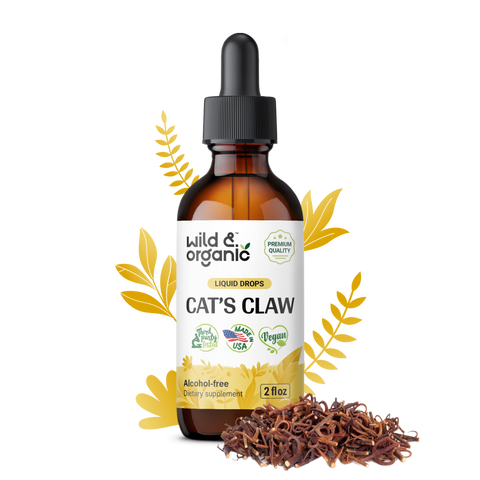health benefits.
Benefits of Cat’s Claw Vitamins
-
BOLSTERING IMMUNITY: Cat’s claw is rich in immunomodulatory alkaloids, which regulate and balance immune function. They stimulate fresh immune cells and enhance their ability to fight off pathogens. Plus, our drops boost the production of white blood cells, necessary to fight infections.
-
SUPPORTING JOINTS & MUSCLES: Pain-free joints? It’s possible with cat's claw! It reduces pain and stiffness for people with osteoarthritis, and may mitigate swollen, painful joints for those with rheumatoid arthritis. Cat's Claw helps decrease inflammation markers, promoting strong muscle and skeletal systems.
-
AIDING DIGESTION: Alkaloids, polyphenols and triterpenes found in cat’s claw help combat digestive disorders, such as IBD (inflammatory bowel disease). With its antioxidant, anti-inflammatory and anti-ulcer properties, cat’s claw fights oxidative stress, reduces gastrointestinal inflammation and supports the integrity of the digestive lining.
Key benefits
-
HEALTHY AGING: Oxidative stress, caused by an imbalance between free radicals and antioxidants, can lead to cellular damage and contribute to premature aging. Cat’s claw, rich with polyphenols, neutralizes free radicals, combats oxidative damage, and decelerates aging, helping you stay youthful and fresh.
-
BLOOD PRESSURE CONTROL: Our cat's claw supplement is teeming with alkaloids, which have antihypertensive effects: they relax blood vessels, promote vasodilation, and reduce peripheral vascular resistance. This all contributes to overall heart health and optimal blood pressure levels.
Additional benefits
Why Is Our Cat’s Claw Tincture a Must-Try?
FAQ
What is cat’s claw and why’s it called that?
Cat's claw, with its scientific name Uncaria tomentosa, is a medicinal herb that grows in the Amazon rainforest. It is named "cat's claw" due to its unique appearance. The plant has vine-like growth with curved thorns resembling the cat claws.
Interesting fact: The name "cat's claw" is also attributed to the traditional usage of the herb by indigenous people, who noticed that the wildcats would climb trees and use their claws to scrape the bark of the cat's claw plant. Inspired by this behavior and the physical resemblance of the plant's thorns to a cat's claws, the herb came to be known as "cat's claw."
In modern times, it has gained popularity as a natural remedy for immune support, joint health, digestive wellness, and other potent benefits.
How do I take this cat’s claw tincture?
We recommend taking 1 full squeeze of the dropper of our cat’s claw tincture three (3) times each day.
- Give the bottle a good shake to ensure proper mixing.
- Press the dropper bulb to draw the desired amount of tincture.
- Blend the tincture with at least 2 ounces of water or any preferred beverage like a smoothie or juice. With glycerin lending a natural sweetness, our drops can enrich your drink with a gentle, pleasing flavor.
- Enjoy your revitalizing drink!
For optimal results, we recommend consistent usage for a period of three months. This timeframe allows the tincture to have a maximum impact on your health, unveiling its full range of benefits.
What are the advantages of tinctures?
Tinctures offer distinct benefits compared to traditional pills or capsules:
- Their liquid state allows for quick absorption within 2-3 minutes, delivering beneficial compounds directly to your body, bypassing digestion.
- With superior bioavailability, an impressive 98% of our tincture is absorbed, greatly surpassing typical tablets, ensuring you obtain the full benefits.
- Our tinctures, sweetened with natural glycerin and zero sugar, are ideal for those monitoring sugar consumption.
- Glycerin's preservative properties enhance tincture longevity, maintaining herbal extract potency over time.
- With compact packaging and ease of use, our tinctures fit effortlessly into your daily routine, be it at home, work, or travel.
How should I store my tincture?
- Store the tincture in a chilly, dark place, away from immediate sunlight. Persistent exposure to warmth and light can gradually degrade its effectiveness. Refrigerator storage is permitted for our tinctures.
- Post consumption, make certain the cap or dropper cover is securely fastened to avert exposure to air, possibly causing oxidation and compromising the tincture's quality.
- Preserve the cleanliness of the dropper; avoid contact with your mouth or any surfaces to prevent bacterial introduction that could reduce the product's lifespan.

















